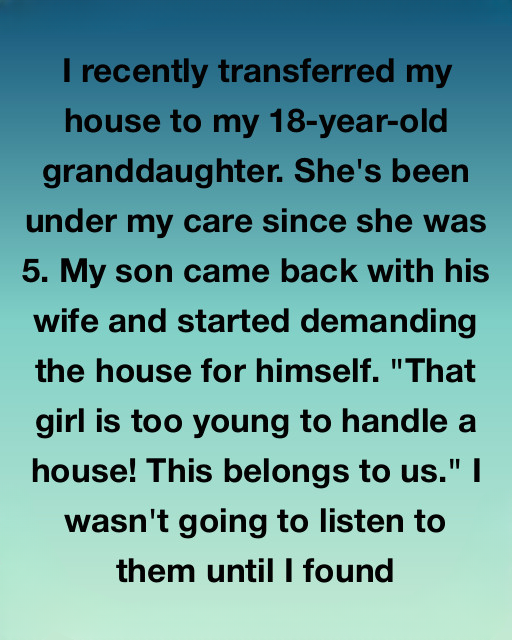I signed my house over to my granddaughter, Maya, not because I was desperate or dying, but because it was time. At eighteen, she was ready to stand on her own, and I wanted her to have something real—something no one could ever take from her. The Seattle house wasn’t extravagant, but it was ours. I had paid it off over a lifetime, and it symbolized everything I wanted her to inherit: safety, stability, and love.
Maya had lived with me since she was five. My son Thomas and his wife Sharon had gone overseas for a “temporary” job that stretched into a decade of silence. Postcards became emails, emails became nothing. Birthdays, school plays, graduations—they missed it all. I stopped waiting. Maya became my world, my second chance at motherhood done right.
When Thomas reappeared thirteen years later, it felt like a ghost I didn’t want back. He and Sharon showed up with luggage and fake smiles, pretending it was a family reunion. I knew better—they had heard I’d transferred the deed to Maya, and their visit was about possession, not reconciliation.
During dinner, Thomas leaned back, voice sharp with entitlement. “Mom, you shouldn’t have given the house to Maya. She’s too young. It belongs to the family—our family.” Sharon nodded, adding, “We need a place to start over. You’ve had your time here.”
I looked him in the eye. “Thomas, you abandoned your family. You don’t get to walk back in and demand what isn’t yours. The house is Maya’s—legally and permanently.”
They tried to argue, whispering to Maya, promising clothes and trips, painting me as confused or manipulative. Maya grew quiet, tense. At night, doubts crept in—had I burdened her too soon? But seeing Thomas and Sharon’s greed reminded me why I had acted.
A week later, while cleaning the attic, I found something that shattered my illusions. Beneath old boxes was Thomas’s childhood trunk. Inside, a yellowed postcard from Seattle Family Court, dated thirteen years ago: permanent custody of Maya had been granted to me due to their absence and lack of support. All parental rights had been terminated.
My son hadn’t just abandoned her emotionally; he had legally erased her from his life. Their trip abroad hadn’t been for opportunity—it had been an escape from responsibility.
I went straight to the courthouse, confirmed the record, and understood everything: their sudden return wasn’t about family—it was about money. They panicked when they learned I’d transferred the deed. But the house was in a trust designed to protect Maya, exempt from inheritance taxes, and legally hers. Their attempt to claim it triggered scrutiny of their unpaid child support and legal neglect.
When I confronted them, I didn’t yell. I laid the court documents on the table. “You were served thirteen years ago. You ignored every notice. You lost custody because you didn’t care enough to fight. You don’t get to rewrite history.”
Thomas turned pale. Sharon tried to protest. Within two days, they were gone—no goodbyes, no apologies. Peace returned to the house. Family court later demanded they pay the years of missed support. I didn’t gloat—the truth had done its work.
That evening, I explained everything to Maya. She didn’t cry, just looked at me calmly. “Thank you, Grandma,” she said softly. “Thank you for choosing me.”
It struck me then—the real deed wasn’t the legal document. It was the love that had bound us together when her parents walked away. The house was a symbol; the true inheritance was stability, trust, and unconditional love.
Now, when I look at the house—the flowers outside, the sunlight in the kitchen—I see a promise kept. Thomas and Sharon chased money and image. I chose love. And love won.
Maya sometimes asks if I regret giving her the house so soon. I tell her no. The house is her foundation, but more importantly, it’s proof that family isn’t defined by blood—it’s defined by choice.
The greatest deed I ever signed wasn’t filed in a courthouse. It was written in sleepless nights, packed lunches, and sacrifices for a child who became my everything. That’s the only deed that matters.
